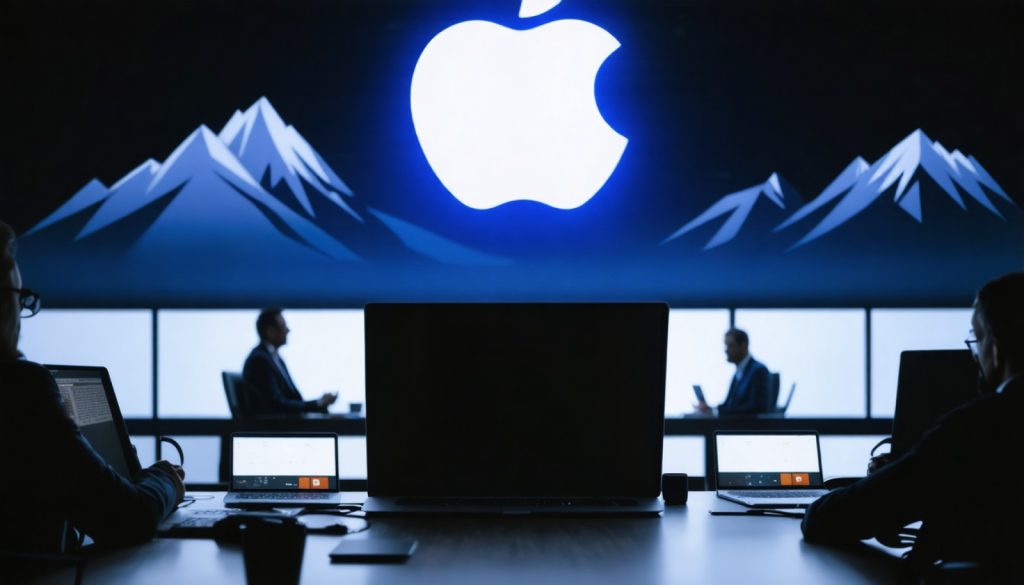
- The U.S. tech industry faces significant challenges as tariffs enacted by Donald Trump impact financial markets.
- Major tech companies, including Apple and Nvidia, suffer substantial stock declines, highlighting their vulnerability to political changes.
- Startups like Klarna and StubHub postpone IPOs amid economic uncertainty.
- Apple and Nvidia confront supply chain difficulties due to geopolitical tensions, particularly with China.
- Tesla, led by Elon Musk, seeks tariff-free agreements amidst declining share values and complicated U.S.-China relations.
- TikTok avoids a ban as ByteDance and U.S. authorities engage in complex negotiations over national security concerns.
- Silicon Valley must adapt to shifting political and economic landscapes, underscoring the interplay between commerce and politics.
- The industry’s future relies on its ability to recalibrate and innovate in response to global economic and political challenges.
The bustling arena of the U.S. tech industry stood on alert last week as sweeping tariffs enacted by Donald Trump sent tremors through financial markets. Once again, the delicate dance between technology titans and politics spotlighted the close-knit ties—and profound rifts—that characterize Silicon Valley’s contemporary narrative.
Tech stocks, normally bastions of financial optimism, felt the sting first. The specter of declining market value loomed large, with the largest drop since the announcement surpassing the entire worth of the U.S. stock market back in 1990. Household names like Apple and Nvidia bore the brunt with staggering double-digit losses, their stock prices dipped by a sudden wave of uncertainty. The chill of postponed IPOs swept through promising startups like Klarna and StubHub, their anticipated market entries shrouded by the haze of economic turmoil.
Visualize Apple, a multinational emblem of innovation, caught in the crosshairs of global trade. Its vast supply chain weaves through nations now facing U.S. tariffs, notably China, exemplifying how the intricate web of global commerce tangles with political gambits. Despite ongoing efforts to shift production to countries such as India, the process hasn’t kept pace with the demands of shifting geopolitical landscapes. Apple’s plight is not isolated. Nvidia’s delicate semiconductor supply chain, equally intricate, grapples with the limits imposed by geography and policy.
Elon Musk’s Tesla is in a similar bind, with plummeting shares reflecting the aphotic waters navigating through U.S.-China relations. Efforts to secure a tariff-free agreement echo through the air as Musk voices his preference for open, unfettered trade opportunities. Yet murmurs from European leaders dismiss these economic hopes, brushing off tariffs as mere political machinations.
But this eruption of economic chaos doesn’t stop at Musk’s front door. As whispers of his potential exit from a pivotal role in the White House scatter through political circles, Musk’s historical sway wanes. The White House portrays a picture of mutual camaraderie, yet the future remains hazy. Even his connection to JD Vance, another prominent figure entwined with Trump, unveils fissures in this high-stakes narrative.
Meanwhile, TikTok, the unruly child of the social media world, narrowly evades a ban’s grasp once again. Deliberations surrounding its future intensify as complex geopolitical chess plays out between ByteDance, its parent company, and American governance. As the dialogue extends, both parties chase a resolution that satisfies national security and business interests.
Amid this tumultuous tableau, a key revelation crystallizes: as political winds shift, so too must the sails of these Silicon Valley giants. Adapting to the new geopolitical climate won’t be a choice, but a necessity. With economic fates seemingly as mercurial as the tides, perhaps the greatest lesson is the stark reminder of how closely economy and ideology, commerce and politics, are interwoven—an entanglement that demands both caution and innovation to navigate.
As we peer into the widening gyre of tech and politics, one may ponder: can Silicon Valley recalibrate its trajectory, acknowledging its pivotal role while shouldering new responsibilities in an ever-evolving economic landscape? The answer lies not just in predictions but in actions still yet to unfold.
How Tariffs Are Reshaping the U.S. Tech Landscape: Immediate Realities and Long-Term Predictions
Understanding the Impact of Tariffs on the U.S. Tech Industry
The recent introduction of tariffs by the Trump administration has sent ripples through the U.S. tech industry, highlighting vulnerabilities and prompting urgent strategy shifts among major players like Apple, Nvidia, and Tesla. These tariffs, primarily targeting imports from China, emphasize the intrinsic ties—and unavoidable tensions—between technology and politics.
Key Facts and Insights
1. Tariffs and Supply Chain Disruptions:
– Apple’s Global Supply Chain: Apple’s reliance on China for manufacturing is substantial, and while initiatives to diversify production into countries like India have been set in motion, these efforts are not progressing swiftly enough to mitigate immediate impacts. The implications of disrupted supply lines could lead to increased costs for consumer products.
– Nvidia’s Semiconductor Challenges: As a key player in the semiconductor market, Nvidia faces supply constraints exacerbated by tariffs. The intricacies of semiconductor production, which often involve multiple countries, create challenges for companies reliant on a harmonious global market.
2. Financial Market Volatility:
– Tech stocks, once considered reliable investments, are experiencing unprecedented volatility. The drop in stock values for companies like Apple and Nvidia has been significant, with some losing more value than entire market caps from decades past.
– The postponement of IPOs from emerging tech startups like Klarna and StubHub reflects a market hesitant to embrace new ventures amid economic uncertainty.
3. Geopolitical Chess and Corporate Strategy:
– Elon Musk’s Stance: Musk has publicly advocated for tariff-free trade agreements, emphasizing the need for open global markets to sustain innovation. Despite these calls, the geopolitical terrain remains challenging, especially given existing tensions between the U.S. and China.
– TikTok’s Vulnerable Position: TikTok’s precarious standing illustrates the intersection of technology, national security, and politics. ByteDance, TikTok’s parent company, continues negotiations to address U.S. security concerns without stalling business operations.
How-To Steps & Life Hacks for Tech Businesses
– Adapting Supply Chains: Businesses should consider diversifying their supply chain sources to reduce reliance on any single country. Investing in local manufacturing and exploring new partnerships can mitigate risk.
– Hedging Against Market Volatility: Companies can protect themselves from market fluctuations by diversifying their investment portfolios and employing financial hedging strategies.
– Proactive Policy Engagement: Engaging with policymakers and staying informed about potential regulatory changes can help businesses anticipate and adapt to new realities.
Pros & Cons Overview
– Pros:
– Potential for businesses to become more resilient by diversifying supply chains and exploring new markets.
– Opportunity for companies to innovate and adapt, contributing to long-term stability and growth.
– Cons:
– Immediate financial impacts, including increased costs and reduced stock valuations.
– Complexity and uncertainty in navigating geopolitical tensions which may hinder rapid decision-making.
Security & Sustainability Considerations
– National Security Risks: Ongoing tensions involve critical discussions of cybersecurity and data privacy, especially concerning foreign-owned apps like TikTok.
– Environmental Impact of Production Shifts: As companies like Apple consider shifting production, they must also account for the environmental implications of moving manufacturing bases.
Conclusion: Actionable Recommendations
– Focus on Innovation: Silicon Valley companies must relentlessly pursue innovation to remain competitive and resilient amid geopolitical shifts.
– Developing Comprehensive Contingency Plans: Creating thorough contingency plans that address supply chain vulnerabilities and political uncertainties can prepare companies for rapid change.
– Engage in International Diplomatic Efforts: Tech companies should collaborate with international partners and governments to influence positive policy development.
For more on the interplay of technology and politics, follow insights from leading technology news sources like WSJ.
By understanding and adapting to the evolving geopolitical and economic landscapes, tech giants can navigate these turbulent times with caution and strategic foresight.



